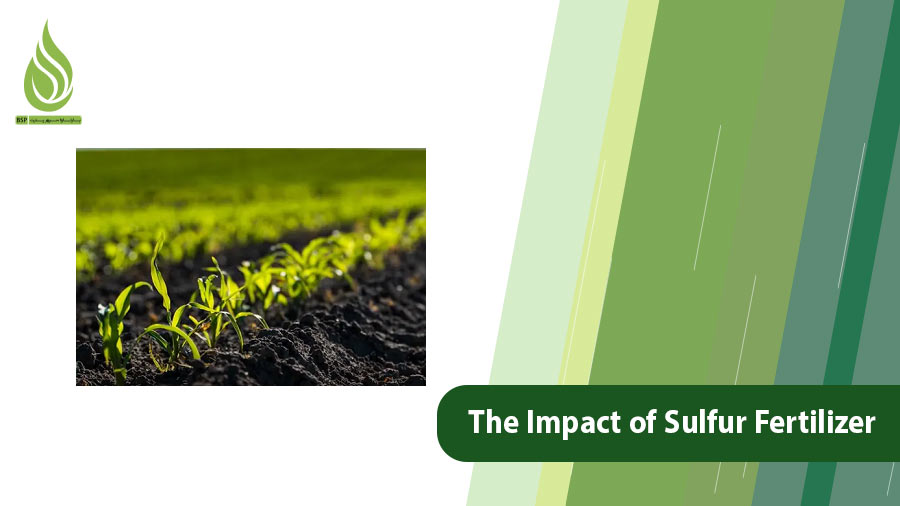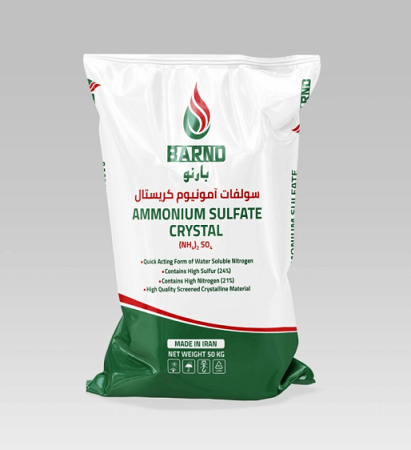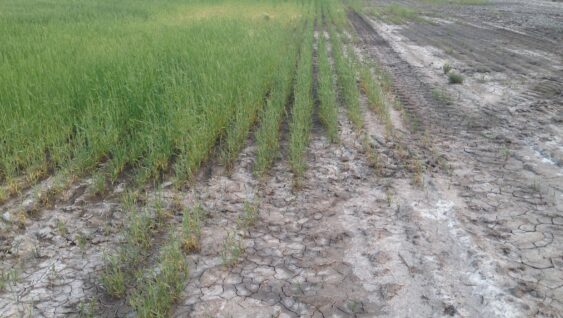
The Impact of Sulfur Fertilizer on Saline and Calcareous Soils
Sulfur plays a crucial role across various domains, with agriculture being a prime example. In the realm of farming, sulfur fertilizer wields a significant impact on the essential processes within plants. Key agricultural staples like grains, vegetables, and fruits rely on sulfur for their development. Understanding the profound influence of sulfur fertilizer in agriculture entails delving deep into the role of this elemental component.
In this piece, we delve into the advantages and impact of sulfur fertilizer, the various forms it takes, indicators of sulfur deficiency, and optimal methods for its application. Join us as we explore the world of sulfur in agriculture. Stick around for more insights!
Introduction to Sulfur Fertilizers
Sulfur, a chemical compound sourced from mines, exists in a stable gaseous state. When this sulfur gas emerges from the earth’s depths, it undergoes a transformation: melting in refineries before solidifying. Typically, soil contains low levels of sulfur due to its natural gaseous form, which swiftly eludes the roots’ grasp.
Crucial for plant health, sulfur ranks as the fourth most vital nutrient after nitrogen, potassium, and phosphorus, influencing growth and metabolic processes. Soil leaching can significantly deplete sulfur levels, necessitating the supplementation of sulfur fertilizers to maintain soil fertility. The choice of sulfur type to augment soil fertility hinges on the target soil pH, with options including ammonium sulfate, potassium sulfate, and superphosphates among mineral sulfur fertilizers.
Sulfur plays a vital role in biological processes closely linked to nitrogen. In the soil, sulfur undergoes a conversion into sulfate before plants can absorb it. Once in the form of sulfate, plants rapidly assimilate sulfur as a nutrient, fostering their growth. For plants, the primary absorbable form of sulfur in soil is the sulfate ion (SO4). Certain bacteria and fungi in the soil oxidize sulfur, making it accessible to plants through sulfur fertilizer. To ensure this process, the soil must host a variety of bacteria. Several conditions are necessary for sulfur oxidation:
- Adequate soil organic matter.
- Optimal soil pH.
- Presence of sulfur particles in the soil.
- Avoid excessive soil leaching.
- Maintain suitable soil temperature, ventilation, and humidity levels.

Spotting Signs of Sulfur Deficiency in Soil
Sulfur deficiency commonly manifests in sandy soils and those prone to leaching. As soil sulfur levels drop, plants exhibit visible symptoms signaling the deficiency. By identifying these signs, we can pinpoint sulfur deficiencies.
The repercussions of insufficient sulfur on plant growth and development are manifold. Inadequate sulfur levels hinder plants from effectively utilizing nitrogen, leading to increased nitrogen loss and nitrate leaching through water drainage.
Effects of Sulfur Deficiency:
- Yellowing of plant leaves
- Stunted plant growth
- Leaf thinning, shrinking, and narrowing
- Yellowing of plant veins
- Decreased fruit yield and weight
- Premature or underdeveloped fruit
Sulfur, being an immobile element, exhibits deficiency symptoms initially in young leaves.
Types of Sulfur Fertilizers in Agriculture
In agriculture, there exist various forms of sulfur fertilizers, each serving distinct purposes:
- Sulfate fertilizers: Apart from supplying sulfur, these fertilizers also enrich the soil with additional nutrients. Examples include ammonium sulfate, magnesium sulfate, iron sulfate, and zinc sulfate, with the sulfate form readily absorbable by plants.
- Mineral sulfur: Derived directly from mines, mineral sulfur may harbor toxic elements like cadmium and aluminum. For safety, processed sulfur is recommended over raw mineral sulfur.
- Refinery sulfur: Extracted from gas and oil reserves, refinery sulfur boasts high purity levels, typically at 99%. To maximize its efficacy, specific soil conditions must be met. Available in powdered and granular forms, these fertilizers are rich in sulfur content.
- Liquid sulfur: Combining mineral oils and powdered sulfur, liquid sulfur contains a lower sulfur percentage. While less effective in enhancing soil structure, it is commonly utilized for plant nutrition and pest and disease management.

Determining the Best Sulfur Fertilizer for Agriculture
The burning question is: which type of sulfur fertilizer reigns supreme in agriculture? Selecting the ideal sulfur fertilizer hinges on assessing its impact on your soil and aligning it with your land’s specific conditions. For instance, ammonium sulfate shines as a top-notch sulfur and nitrogen source. However, its efficacy depends on whether it adequately addresses your soil’s sulfur deficiency. In highly acidic soils, ammonium sulfate alone may fall short. Yet, under optimal pH conditions, this fertilizer can substantially boost plant growth and fruit production. You can choose wisely based on your land’s needs and characteristics for the best results.
The Significance and Impact of Sulfur Fertilizer in Agriculture
Understanding the Impact of Sulfur Fertilizer on Plant Growth
Sulfur stands as a crucial element in plant development. This essential component plays a pivotal role in protein synthesis, chlorophyll production, and enzyme activation within plants. A deficiency of sulfur in the soil can lead to a decline in protein synthesis, stunting plant growth and resulting in yellowing leaves. Chlorophyll, essential for photosynthesis, faces hindrances when sulfur levels are inadequate, complicating the photosynthetic process.
Enzymes, pivotal for cell division and photosynthesis, rely on sulfur for activation. The impact of sulfur fertilizer on these enzymes is substantial. Insufficient sulfur in the soil hampers enzyme activation, halting plant growth. To harness the positive effects of sulfur on plant growth and enhance product quality, precise application of this fertilizer is imperative. Over-fertilization, while beneficial in moderation, can lead to plant demise and detriment to soil and water sources, emphasizing the need for balanced usage.
Balancing pH Levels in Saline and Alkaline Soils
Salt naturally permeates the soil, but at times, its concentration surpasses optimal levels, leading to soil salinity issues. This phenomenon predominantly affects arid and semi-arid regions, with coastal areas also prone to soil salinity due to their proximity to the sea. Elevated soil salinity and alkaline pH levels pose challenges for certain plants and agricultural produce, while excessively low pH levels can also have detrimental effects. Symptoms of soil salinity include leaf desiccation, flower withering, crown diameter reduction, chlorophyll depletion, and leaf discoloration. We also suggest you check some information out about salt tolerant plants.
A proven method to rectify soil pH in agricultural settings involves the application of sulfur fertilizers. Sulfur serves to lower soil pH, creating a more conducive environment for plant thriving. When sulfur fertilizers are introduced to the soil, sulfur-oxidizing bacteria metabolize the sulfur, converting it into an anionic form within the soil through oxidation. This process effectively controls soil pH by generating sulfuric acid, which reacts with alkaline and calcareous elements, fostering an acidic milieu. This soil amendment not only impacts soil pH but also enhances the plant’s ability to absorb essential micronutrients from the soil.

Enhancing Calcareous Soil
Calcareous soil contains over 10% calcium carbonate, a beneficial substance that, when overly abundant, can elevate pH levels, harden the soil, reduce element solubility, and trigger other adverse effects. Typically low in organic matter, calcareous soils pose challenges for mineral element absorption. Remedial measures for calcareous soils include soil leaching, which aids in addressing these issues. Additionally, the application of acidifying agents like sulfur fertilizers and sulfuric acid proves instrumental in ameliorating calcareous soil conditions.
Enhancing Nutrient Solubility
As soil alkalinity rises, nutrient solubility diminishes, impeding plant access to vital elements like phosphorus, iron, and zinc. This scarcity hampers plant growth. Introducing sulfur to the soil serves as a solution, enhancing nutrient availability. The strategic application of sulfur fertilizers ensures a nutrient-rich environment for plants, fostering improved growth and enhanced yields.
Additional Benefits of Sulfur Utilization:
- Fungus Control: Sulfur intake aids in fungus containment, diminishing the necessity for fungicides.
- Soil Health: It plays a role in preserving soil vitality and disinfection.
- Enhanced Soil Fertility: Sulfur contributes to soil enrichment.
- Nutrient Accessibility: Facilitates increased access to nutrients and micronutrients for plants.
- Cold and Drought Resistance: Boosts plant resilience against cold and drought during winter.
- Flavor and Aroma Enhancement: Improves the taste and scent of agricultural produce.
- Nitrogen Absorption: Assists in better nitrogen absorption.
- Quality Improvement: Elevates the performance quality of oil-producing plants.
Optimizing Sulfur Application for Soil Salinity Mitigation
In agriculture, sulfur fertilizers serve various purposes, each dictating the optimal timing for application. When aiming to enhance soil quality, fall and winter stand out as prime seasons for sulfur fertilization. Conversely, farmers often administer sulfur during the growing season to enrich the soil and combat pests. We also suggest you to take a look at fall plant care.
Accurate determination of the required sulfur quantity entails conducting a soil test. Samples extracted from 0-30 cm depth undergo analysis in specialized laboratories to pinpoint the soil’s specific needs. As a rule of thumb, agricultural lands typically necessitate 100-150 kg of sulfur per hectare annually. Regions with higher humidity demand less sulfur, while arid areas benefit from increased sulfur application. In instances of highly saline soils, elevated sulfur quantities might be essential for effective mitigation.
In Conclusion
As elucidated, the utilization of sulfur fertilizer offers myriad benefits to farmers. Among its significant effects is the ability to lower soil pH and combat soil alkalinity. However, caution must be exercised in its application. Exceeding the recommended dosage can lead to plant burn. Moreover, overuse of sulfur can deplete organic matter levels and escalate fungal diseases.
Beyond its impact on plants, excessive sulfur fertilizer consumption poses environmental risks. The runoff of chemical fertilizers into surface and underground water sources can have detrimental effects on human health and wildlife. Striking a balance in sulfur application is not only crucial for plant health but also for the preservation of the broader ecosystem.
